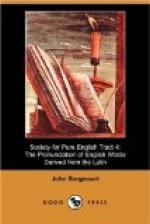Cor[’i]ol[’a]nus in Cor[’i]oli.
It may be safely said that from the Reformation to the nineteenth century no Englishman pronounced the last word otherwise than I have written it. The author of the Pronouncing Dictionary attached to the ‘Dictionary of Gardening’ unfortunately instructs us to say gl[’a]diolus on the ground that the i is short. The ground alleged, though true, is irrelevant, and, although Terence would have pronounced it gl[’a]diolus, Quintilian, like Cicero, would have said glad[’i]olus. Mr. Myles quotes Pliny for the word, but Pliny would no more have thought of saying gl[’a]diolus than we should now think of saying ‘labo[’u]r’ except when we are reading Chaucer.
We need not here discuss the dubious exceptions to this rule, such as words with an enclitic attached, e.g. prim[)a]que in which some authorities put the stress on the vowel which precedes the enclitic, or such clipt words as ‘illuc’, where the stress may at one time have fallen on the last vowel. In any case no English word is concerned.
In very long words the due alternation of stressed and unstressed vowels was not easy to maintain. There was no difficulty in such a combination as h[’o]nor[’i]fic[’a]bil[’i] or as tud[’i]nit[’a]tib[’u]s, but with the halves put together there would be a tendency to say h[’o]nor[’i]ficabilit[’u]dinit[’a]tibus. Thus there ought not to be much difficulty in saying C[’o]nstant[’i]nop[’o]lit[’a]ni, whether you keep the long antepenultima or shorten it after the English way; but he who forced the reluctant word to end an hexameter must have had ‘Constantin[’o]ple’ in his mind, and therefore said Const[’a]ntin[’o]polit[’a]ni with two false stresses. The result was an illicit lengthening of the second o. His other false quantity, the shortening of the second i, was due to the English pronunciation, the influence of such words as ‘metropol[)i]tan’, and, as old schoolmasters used to put it, a neglect of the Gradus. Even when the stress falls on this antepenultimate i, it is short in English speech. Doubtless Milton shortened it in ‘Areopagitica’, just as English usage made him lengthen the initial vowel of the word.
Probably very few of the Englishmen who used the traditional pronunciation of Latin knew that they gave many different sounds to each of the symbols or letters. Words which have been transported bodily into English will provide examples under each head. It will be understood that in the traditional pronunciation of Latin these words were spoken exactly as they are spoken in the English of the present day. For the sake of simplicity it may be allowed us to ignore some distinctions rightly made by phoneticians. Thus the long initial vowel of alias is not really the same as the long initial vowel of area, but the two will be treated as identical. It will thus be possible to write of only three kinds of vowels, long, short, and obscure.




